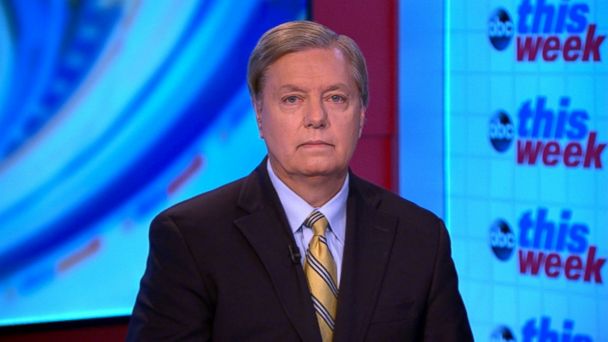Sen. Lindsey Graham 'Worried' Senate Will Reach Deal Majority of House GOP Won't Support
During an interview on "This Week," Republican Sen. Lindsey Graham, R-S.C., said he is worried that a deal to end the government shutdown and raise the debt ceiling could come out of the Senate, but not have the support of a majority of House Republicans.
"Here's what I'm worried about - a deal coming out of the Senate that a majority of Republicans can't vote for in the House," Graham told George Stephanopoulos on "This Week" Sunday. "That really does compromise Speaker Boehner's leadership, and after all this mess is over do we really want to compromise John Boehner as leader of the House? I don't think so. So I'm not going to vote for any plan that I don't think can get a majority of Republicans in the House."
During his appearance on 'This Week," Graham said it was "unrealistic to expect us to be able to defund or delay Obamacare by shutting the government down," but that the fight over the president's signature healthcare law has not ended.
"The fight on Obamacare is far from over. After this mess is behind us Obamacare will be a liability for Democrats and the government shutdown we can survive if we're smart," Graham said.

Senator Lindsey Graham (R) South Carolina on 'This Week'
The federal government has been shut down since October 1, and will reach its borrowing limit on October 17, according to Treasury Secretary Jack Lew. A failure to raise the debt ceiling brings about unknown consequences. In 2011, the fight over whether to raise the debt ceiling was part of the reason the U.S. credit rating was downgraded by financial services company Standard and Poor's.
As the default deadline nears, a deal to reopen the government and raise the debt ceiling has remained elusive. Senate Minority Leader Mitch McConnell, R-Ky., and Senate Majority Leader Harry Reid, D-Nev., remain in negotiations to strike a deal after a proposal by House Republicans was rejected by President Obama this weekend. Reid also rejected a bipartisan proposal on Saturday by Sen. Susan Collins, R-Maine, that would have reopened the government for six months while raising the debt ceiling until the end of January.
For his part, Graham said the solution to the current impasse should come from the House.
"Paul Ryan is working on a plan that could start in the House, that I think would be involving very good government proposals to prevent future shutdowns, to do some things for Obamacare that need to be done in terms of correcting the problem. And quite frankly, putting every member of Congress in the same plan on the same terms as all Americans. I would hope that would come from the House," Graham said.
Democratic Rep. Keith Ellison of Minnesota, appearing on "This Week" with Graham and Republican Rep. Raul Labrador of Idaho, expressed openness to a deal, but insisted that the government reopen and that the debt ceiling be lifted before talks on longer-term changes.
"It's all about … the details," Ellison said. "I cannot support saying that we're going to diminish and lower, say, Social Security in exchange for, I don't know, anything. These folks who exist on that are already on meager amounts of income, and so we're not going to inflict more pain on them."
"But, look, it's all in the mix. Let's reopen the government. Let's pay America's debts," Ellison added. "And I'm open to discuss anything any Republican wants to talk about, but it will be us giving and taking and them giving and taking, not a situation like we have now, which is 'we will stop inflicting pain on America if you get rid of health care,' which brings insurance reform and access to millions of Americans. We can't do that."
When asked if there would be retaliation against Speaker John Boehner if he scheduled a vote on a hypothetical Senate bill that did not have support of a majority of Republicans in the House, Labrador said, "I don't think so. First of all, whatever passes the House of Representatives is going to have the majority of House."